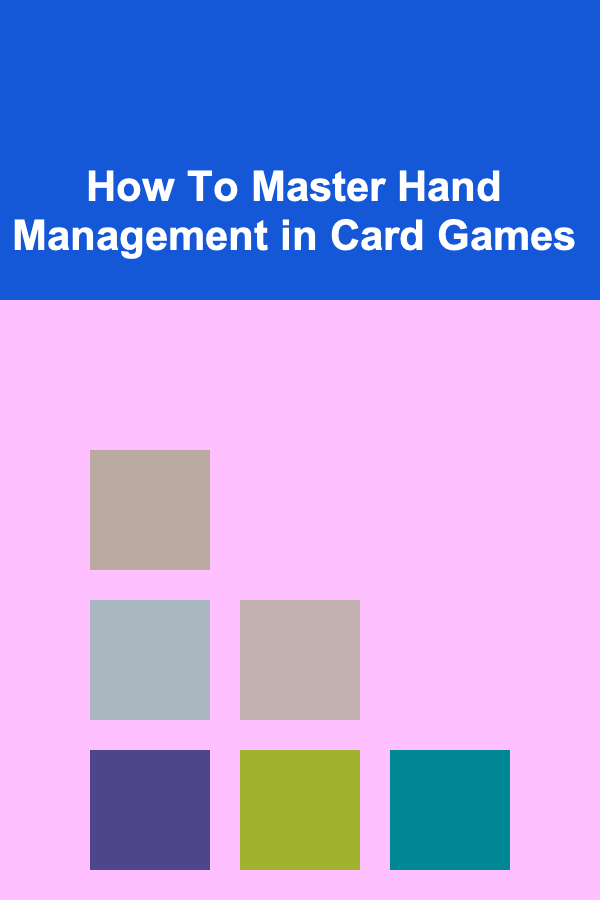
How To Master Hand Management in Card Games
ebook include PDF & Audio bundle (Micro Guide)
$12.99$8.99
Limited Time Offer! Order within the next:

Card games have been a part of human culture for centuries, with their origins stretching back to ancient China, Egypt, and Europe. From classic games like Poker and Bridge to modern games such as Magic: The Gathering or Hearthstone, managing your hand effectively is often the key to success. Whether you're a novice or an experienced player, mastering hand management can significantly improve your ability to make strategic decisions and increase your chances of winning. This article will explore the various aspects of hand management in card games and provide insights into how you can develop this critical skill.
What Is Hand Management?
Hand management refers to the process of organizing, strategizing, and utilizing the cards in your hand in the most effective way possible. It is the art of deciding which cards to play, discard, or hold, and when to take certain actions, such as bluffing or defending. Good hand management is essential in almost every card game, whether the objective is to build the best hand, outwit your opponents, or create combos.
Mastering hand management requires both tactical and strategic thinking. It involves not just playing the best card in a given moment but also planning for future turns, anticipating your opponents' moves, and considering the potential outcomes based on your hand and the game state.
The Importance of Hand Management
Hand management is crucial for several reasons:
- Resource Control: In most card games, your hand represents a limited resource. Cards are often your primary means of attacking, defending, or achieving your goals. How you use these cards can determine whether you are resource-rich or resource-poor.
- Adaptability: A well-managed hand allows you to adapt to different situations and adjust your strategy accordingly. You can respond to your opponent's moves and changing conditions in the game with greater flexibility.
- Minimizing Risk: Poor hand management can lead to situations where you are left with weak cards or no viable plays. By managing your hand effectively, you minimize the risk of getting stuck in such situations.
- Maximizing Potential: Proper hand management maximizes the power of your cards. Even if you have a strong hand, mishandling it can lead to a suboptimal play. Knowing when to hold or discard cards can greatly influence the outcome of the game.
General Strategies for Effective Hand Management
There is no one-size-fits-all approach to hand management, as different games have different mechanics and strategies. However, there are several general principles that can apply across a wide variety of card games. These strategies can help guide your decision-making process.
1. Know the Rules and Objectives
Before you can effectively manage your hand, you need to understand the rules of the game and the primary objective. Is your goal to make the best possible hand? To eliminate opponents? Or to complete certain tasks before your competitors? Understanding the objective will help you prioritize cards in your hand and form a strategy accordingly.
For example, in Poker, your objective is to make the best possible hand, but in games like Bridge or Hearts, your objective may be to control the trick-taking process or avoid certain types of cards. Understanding your goal will also help you assess whether a card is useful to your strategy or if it's better to hold it for a more opportune moment.
2. Evaluate the Value of Each Card
Not all cards in your hand have equal value. Some cards may be more critical to your strategy, while others may only serve as filler or situational plays. You need to evaluate the cards in your hand and assess which ones are essential for your immediate or long-term goals.
Take, for example, a card game like Magic: The Gathering, where players must manage their deck and hand carefully. Some cards may have powerful abilities, while others may be less useful or situational. Knowing which cards to prioritize can help you make better plays and avoid wasting important resources.
3. Consider the Order of Play
In many card games, the order in which you play your cards is just as important as which cards you choose to play. Playing a card at the wrong time can waste its potential or give your opponents an advantage. In contrast, playing a card strategically at the right moment can often swing the game in your favor.
Take Poker, for instance. A well-timed bluff can cause your opponent to fold, giving you the pot without showing your cards. In games like Hearts, knowing when to pass certain cards to opponents can influence your strategy and minimize the points you receive.
4. Observe Opponent Behavior
Hand management is not just about managing your cards but also about managing your opponents. The way your opponents play their cards can provide clues about what cards they have in their hands, their strategy, and their overall play style.
For instance, in games like Bridge or Poker, observing your opponents' betting patterns or playing choices can give you valuable information about their hands. Using this information to anticipate their moves and adjust your hand management accordingly is a critical skill.
5. Plan for Future Turns
Successful hand management often involves thinking ahead. You need to plan not only for the current round but also for the upcoming ones. This means anticipating the cards you might draw, the moves your opponents will make, and how your current hand will evolve as the game progresses.
For example, in games like Rummy or Gin Rummy, managing your hand over several rounds is essential. You may need to discard cards that are not useful but keep others that could become valuable later on. Likewise, in games like Poker, you need to consider how your hand will evolve based on the community cards or your own actions.
6. Discarding Unnecessary Cards
In many games, you will need to discard cards that are not useful. Knowing when and what to discard can make a significant difference in your hand management. Discarding unnecessary cards allows you to improve the quality of your hand and reduce the chance of holding onto cards that will not help you in the long run.
For example, in games like Poker or Bridge, you may want to discard cards that do not contribute to your best possible hand. In games like Rummy, you need to consider discarding cards that do not fit into any of your potential melds.
7. Avoid Overcommitting to One Strategy
While having a strategy is important, it is also crucial not to overcommit to a single plan of action. Sometimes, the game's state will change, or your opponents will counter your strategy in unexpected ways. If you stick too rigidly to a single strategy, you risk being caught off guard.
Good hand management requires flexibility. If your original strategy isn't working, be willing to adapt and change your approach. This may mean shifting from an aggressive stance to a defensive one or focusing on a different type of play.
Game-Specific Hand Management Strategies
While the general principles of hand management apply to most card games, different games require specific strategies. Below, we'll explore how hand management works in some of the most popular card games.
Poker
Poker is one of the most widely played and competitive card games in the world, and hand management is absolutely critical to success. In Poker, your hand is the most important aspect of the game, and how you manage it can determine whether you win or lose.
- Know When to Fold: One of the most crucial aspects of Poker is knowing when to fold. If you have a weak hand or the community cards are unfavorable, folding early can save you from losing more chips.
- Bluffing: Bluffing is a key element of Poker. Good hand management often involves knowing when to bluff and when to play your hand straight. Effective bluffing can trick opponents into folding, even if you don't have the best hand.
- Positioning: Your position at the table (whether you're playing early or late) can greatly affect how you manage your hand. Being in a later position gives you more information about your opponents' actions and allows you to manage your hand more effectively.
Bridge
In Bridge, hand management involves not only your cards but also communication with your partner. Here, managing your hand is about balancing offense and defense and deciding when to bid, play, or pass.
- Suit Management: One of the main aspects of hand management in Bridge is managing the suits. Whether you're trying to establish a suit or play control cards, your hand's suit structure will guide your strategy.
- Trick Management: Bridge is often about winning tricks. Knowing when to play high or low cards, and when to sacrifice a trick, can help your team win the game.
Hearthstone
Hearthstone is a digital collectible card game where hand management involves building a deck and playing cards strategically in real-time against opponents.
- Mana Management: Mana is a critical resource in Hearthstone, and managing your cards relative to your mana curve is crucial. You need to know which cards to play early on and which cards to hold onto for later turns.
- Card Synergies: In Hearthstone, certain cards work better together. Hand management involves understanding synergies between cards and knowing when to play them to maximize their effect.
Conclusion
Mastering hand management in card games is an essential skill that can greatly improve your chances of success. Whether you're playing Poker, Bridge, Hearthstone, or any other card game, the ability to manage your hand effectively can make the difference between victory and defeat. By understanding your objectives, evaluating the value of your cards, planning for future turns, and adjusting your strategy based on your opponents, you can take your card-playing skills to the next level.
Good hand management isn't just about playing the right card at the right time; it's about thinking ahead, adapting to the game state, and outsmarting your opponents. With practice and experience, you'll be able to make better decisions and become a more formidable player in any card game you choose to play.

How to Choose the Best Credit Card for Your Lifestyle
Read More
How to Create a DIY Party Invitation That Matches Your Theme
Read More
How to Implement Simple Strategies for Reducing Food Waste in Your Kitchen
Read More
How to Set Up Automatic Savings to Reach Your Financial Goals
Read More
How To Practice Respectful Disagreement
Read More
Mastering Basic Computer Troubleshooting
Read MoreOther Products

How to Choose the Best Credit Card for Your Lifestyle
Read More
How to Create a DIY Party Invitation That Matches Your Theme
Read More
How to Implement Simple Strategies for Reducing Food Waste in Your Kitchen
Read More
How to Set Up Automatic Savings to Reach Your Financial Goals
Read More
How To Practice Respectful Disagreement
Read More